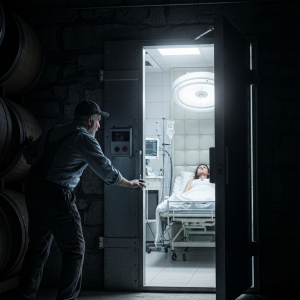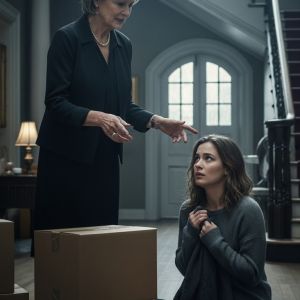Growing up, I desperately wanted to be best friends with my older sister, Sasha. I was her shadow, her most devoted admirer. I copied her wardrobe, took up her hobbies, and celebrated her every achievement with a fierce, genuine pride. When she would come home, waving a trophy from a track meet or a dance competition, I was always the first one she would tell. “Bet you couldn’t do this, could you?” she’d taunt, waving the award in my face. Instead of getting jealous, I’d hug her tight and tell her how happy I was for her. This, for some reason, only made her angrier. She would shove me away, sometimes so hard I’d fall to the floor, leaving me confused and bruised on the carpet.
It wasn’t until my twelfth birthday that the last vestiges of my childhood adoration finally shattered. My parents had given me a pink, glittery bicycle—the exact one Sasha had wanted for years but never received. As soon as I unboxed it, my first thought was to share my joy with her. I ran to her room and begged her to be the first one to ride it.
A strange, cruel smirk plastered itself on her face. “Sure,” she said. She walked the bike to the end of our driveway. I thought she was going for a ride down the street. Instead, she locked eyes with me, a look of cold triumph on her face, and deliberately threw my brand new bike into the path of an oncoming truck. I watched, frozen in horror, as it was mangled into a twisted wreck of pink metal and shattered plastic. My heart broke. And in that moment, my childhood ended. I vowed to never again share my achievements or my happiness with her.
Unfortunately, when I was fourteen, I won first place at the regional cross-country championships. Sasha, who was still living at home, overheard my parents talking about it. To my surprise, she didn’t flip out. She asked to come to my awards ceremony. I, a fool for any glimmer of hope, enthusiastically said yes, thinking this was her attempt to finally rebuild our friendship.
On the big day, the coach announced the winners, starting from the lowest place and working his way up. He called third place. He called second place. He was just about to announce my name for first place when, from the corner of my eye, I saw Sasha dramatically collapse onto the floor. The entire gymnasium turned to look. Gasps and worried murmurs filled the air as my parents rushed to her side. She didn’t “wake up” until the sound of ambulance sirens echoed outside. “Oh, sorry everyone,” she announced, jolting upright with perfect comedic timing. “I just didn’t eat enough today.” Everyone marveled at her recovery. My name was never called. My victory was erased. I just rolled my eyes.
From then on, I kept my life a secret. It was a lonely existence, but it was safer. This all came to a head when I was seventeen. I got accepted into an Ivy League university. It was the culmination of years of silent, solitary hard work. My parents found the acceptance letter before I did. When I got home, my mom was screaming with joy. “Honey, we are so proud of you!” For the first time in years, I let myself believe it. They plastered photos of me with the letter all over their social media. I thought, finally, this is an achievement so big, so undeniable, that Sasha can’t possibly ruin it.
I was wrong. The very next day, I woke up to my parents barging into my room, throwing my belongings into black garbage bags. “Your sister,” my mom said, her voice shaking, my dad with tears in his eyes, “has just been diagnosed with stage three ovarian cancer. She’ll need one room for her things, and this one to sleep in.”
A cold, sickening certainty washed over me. I knew, with every fiber of my being, that she was faking it.
Sasha came home later that day, a smug smirk on her face. Her head was completely bald, which was odd, considering I’d seen a photo on her social media of her long hair blowing in the wind just a month prior. She feigned exhaustion and went straight to bed. That night, I cooked her favorite meal, luring her into a false sense of security, playing the part of the concerned little sister.
Two weeks later, Sasha hosted a party to “commemorate her own bravery.” She invited everyone we knew. Halfway through, I tapped my glass with a fork. “Sasha, make a speech! We’re so proud of you!” She launched into a performance she had clearly practiced for hours, complete with fake tears. As she was reaching the crescendo of her tragic monologue, I walked up to her, hugged her, and as I pulled away, I peeled the bald cap right off her head.
Her long, blonde hair unraveled down to her waist. Sasha screamed. My mom gasped so hard I thought her lungs would collapse. While everyone stared in stunned silence, I turned on the TV and broadcasted a clip I had secretly recorded of Sasha practicing her cancer speech in the mirror. She didn’t even try to face up to her lies. She just stormed out of the house and drove away.
The next morning, my mom slapped me across the face. “How could you embarrass Sasha like that while she’s battling cancer?” I just stared at her, my cheek burning. Sasha, it turned out, had called them with another, even more audacious lie: she claimed I had ripped out her “realistic hair extensions,” which she had spent thousands on because she didn’t want people to pity her for being bald. My parents, desperate to believe in their daughter’s victimhood, bought it completely.
Over the next few days, Sasha’s campaign of manipulation escalated. She came back with a stack of faked medical documents—appointment cards, test results, a full treatment schedule. I don’t know how she did it, but they looked real enough to convince my parents. She then started telling them I was being emotionally abusive, that I was jealous of the attention she was getting for her illness. They scheduled an emergency therapy appointment for me, telling the therapist I was showing signs of narcissistic personality disorder.
Those sessions were brutal. I had to sit there while a well-meaning but completely misled woman asked me to explore my “jealousy issues.” Every time I tried to explain that Sasha was lying, the therapist would just nod sympathetically and make a note about my “denial.”
Meanwhile, Sasha had taken over my life. She destroyed my laptop, erasing years of my schoolwork and my college application materials. She spread rumors at school that I was unstable, that I had attacked my cancer-stricken sister. My friends started to avoid me. My lunch table slowly emptied until I was eating alone. Then came the letter from my dream college. They had received an anonymous tip about my “concerning behavior” and were investigating before finalizing my enrollment. I knew it was Sasha.
I started documenting everything, building a case. I bought tiny voice recorders and hid them around the house. The recordings were more damning than I could have imagined. I’d hear her on the phone late at night, laughing with her friends about how gullible our parents were, bragging about ruining my college plans. I saved every file, but I needed an ally.
That’s when I remembered my Aunt Helen. She had always been skeptical of Sasha’s flair for the dramatic. I called her from a payphone and told her everything. She listened, and then she said she’d be over that weekend. When she arrived, she played the part of the concerned aunt perfectly. Later, in the privacy of my temporary room, I showed her the evidence. Her face grew darker with each recording. As a former legal assistant who handled medical malpractice cases, she immediately spotted the inconsistencies in Sasha’s forged documents.
We planned a confrontation for dinner that night. Helen started casually, asking Sasha about her treatment. When she asked for the oncologist’s name so she could send a thank you card, Sasha suddenly had to use the bathroom. While she was gone, Helen showed my parents my evidence. My mother’s face went white when she heard Sasha laughing about fooling them. My father’s expression shifted from disbelief to horror to a deep, simmering rage.
When Sasha returned, the silence in the room was deafening. My father stood up and asked her, point-blank, if she had cancer. The tears started, but he just repeated the question. Finally, she exploded. The truth came pouring out in a torrent of rage and resentment. She screamed that it was our fault, that we loved my achievements more than we loved her, that destroying my bike was the only time she ever felt powerful. She admitted to everything—the cancer, the laptop, the rumors, the letter to my college—but insisted it was because we had made her feel invisible.
The breakdown was terrifying. She lunged at me, screaming that I had stolen her life just by being born. My mom, trying to intervene, got a deep scratch on her arm from Sasha’s nails. The sight of blood finally snapped everyone out of their shock. Helen called 911. The paramedics ended up taking Sasha for a psychiatric evaluation.
The aftermath was a quiet, desolate landscape of apologies and regret. My parents were horrified, not just by Sasha’s lies, but by their own blindness. Sasha was diagnosed with narcissistic personality disorder and borderline traits. She was admitted to a long-term residential treatment facility.
The house was peaceful without her, but the silence was heavy with all the things that had been broken. Slowly, cautiously, we began to heal. I sent the recording of Sasha’s confession to my college, and they reinstated my acceptance. My parents came to every one of my senior year awards ceremonies, their pride now genuine and heartfelt.
Recovery is not a straight line. Sasha has been in treatment for two years. There are family therapy sessions, awkward and painful at first, where we are all learning a new language of boundaries and accountability. She has apologized, a real apology, for specific incidents, acknowledging the harm she caused. It’s a start.
Two years to the day after the intervention, she showed up at my door. She had been discharged from the residential program and was living in a transitional apartment. She looked healthier, calmer. She stood on my porch, twisting her hands nervously. “I know I have no right to ask this,” she said, her voice quiet. “But… do you think we can ever be sisters again?”
I looked at her, at the woman who had tried to destroy my life, and I didn’t see a monster. I saw someone who was sick, someone who was trying to get better. I thought about the pink bike, the bald cap, the years of pain. And then I thought about the future. “I don’t know, Sasha,” I said honestly. “But maybe… maybe we can try.” I stepped aside and held the door open. It wasn’t forgiveness, not yet. But it was a beginning.
The following years were a testament to the slow, arduous process of rebuilding. College was my sanctuary, a place where I was defined by my work and my friendships, not by my family’s drama. I majored in biochemistry, losing myself in the intricate dance of molecules, a world of logic and reason that felt blessedly far from the emotional chaos I had grown up in. I kept in touch with my parents, our conversations slowly evolving from strained apologies to something resembling normalcy.
Sasha’s journey was more complex. The residential treatment gave way to outpatient therapy and a part-time job at a bookstore. There were setbacks—moments of jealousy when I would share good news, flashes of the old manipulation. But there was also progress. She started taking responsibility for her actions without blaming others. She learned to identify her emotional triggers and develop healthier coping mechanisms.
The first time I came home from college for a holiday, the tension was palpable. We all sat around the dinner table like strangers. But by the end of my sophomore year, something had shifted. She offered to help me study for an organic chemistry exam. We spent an afternoon in her small apartment, surrounded by textbooks, and for a few hours, it was just two sisters working on a problem. It was fragile and new, but it was something.
By the time I graduated, with my parents and a surprisingly supportive Sasha in the audience, our relationship had found a new, cautious rhythm. It wasn’t the friendship I had craved as a child, but it was functional, built on a foundation of hard-won respect and carefully maintained boundaries. The night before I left for graduate school, she gave me a small gift—a framed photo of us as kids, before everything went wrong, both of us grinning at the camera. I hung it in my new apartment, a reminder that people can change, that families can heal, and that forgiveness, while not always possible, is sometimes worth the effort.




